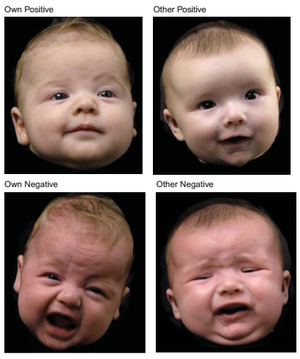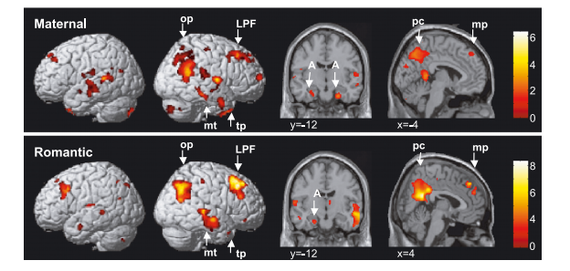Alan: Perhaps my small sample is unrepresentative.
Nevertheless, it has been my experience that when women have children, the newborn often displaces Dad as center of attention.
Nevertheless, it has been my experience that when women have children, the newborn often displaces Dad as center of attention.
Forevermore, men are considered "handy redundancies" - and sometimes just redundancies.
I find woman's instinctual re-commitment to her children -- often to the (relative) exclusion of "father" -- an unpleasant manifestation of hormones, anatomy and physiology "pushing Mom around" on behalf of Evolution's "survival advantage," however marginal that advantage may now be.
I find woman's instinctual re-commitment to her children -- often to the (relative) exclusion of "father" -- an unpleasant manifestation of hormones, anatomy and physiology "pushing Mom around" on behalf of Evolution's "survival advantage," however marginal that advantage may now be.
Five Reasons You Should Have Sex With Your Husband Every Night
What Happens to a Woman's Brain When She Becomes a Mother
From joy and attachment to anxiety and protectiveness, mothering behavior begins with biochemical reactions.

The artist Sarah Walker once told me that becoming a mother is like discovering the existence of a strange new room in the house where you already live. I always liked Walker's description because it's more precise than the shorthand most people use for life with a newborn: Everything changes.
Because a lot of things do change, of course, but for new mothers, some of the starkest differences are also the most intimate ones—the emotional changes. Which, it turns out, are also largely neurological.
Even before a woman gives birth, pregnancy tinkers with the very structure of her brain, several neurologists told me. After centuries of observing behavioral changes in new mothers, scientists are only recently beginning to definitively link the way a woman acts with what's happening in her prefrontal cortex, midbrain, parietal lobes, and elsewhere. Gray matter becomes more concentrated. Activity increases in regions that control empathy, anxiety, and social interaction. On the most basic level, these changes, prompted by a flood of hormones during pregnancy and in the postpartum period, help attract a new mother to her baby. In other words, those maternal feelings of overwhelming love, fierce protectiveness, and constant worry begin with reactions in the brain.
Mapping the maternal brain is also, many scientists believe, the key to understanding why so many new mothers experience serious anxiety and depression. An estimated one in six women suffers from postpartum depression, and many more develop behaviors like compulsively washing hands and obsessively checking whether the baby is breathing.
"This is what we call an aspect of almost the obsessive compulsive behaviors during the very first few months after the baby's arrival," maternal brain researcher Pilyoung Kim told me. "Mothers actually report very high levels of patterns of thinking about things that they cannot control. They're constantly thinking about baby. Is baby healthy? Sick? Full?"
women looking at photos of their own babies versus
unfamiliar babies. (Society of Neuroscience)
"In new moms, there are changes in many of the brain areas," Kim continued. "Growth in brain regions involved in emotion regulation, empathy-related regions, but also what we call maternal motivation—and I think this region could be largely related to obsessive-compulsive behaviors. In animals and humans during the postpartum period, there's an enormous desire to take care of their own child."
There are several interconnected brain regions that help drive mothering behaviors and mood.
Of particular interest to researchers is the almond-shaped set of neurons known as the amygdala, which helps process memory and drives emotional reactions like fear, anxiety, and aggression. In a normal brain, activity in the amygdala grows in the weeks and months after giving birth. This growth, researchers believe, is correlated with how a new mother behaves—an enhanced amygdala makes her hypersensitive to her baby's needs—while a cocktail of hormones, which find more receptors in a larger amygdala, help create a positive feedback loop to motivate mothering behaviors. Just by staring at her baby, the reward centers of a mother's brain will light up, scientists have found in several studies. This maternal brain circuitry influences the syrupy way a mother speaks to her baby, how attentive she is, even the affection she feels for her baby. It's not surprising, then, that damage to the amygdala is associated with higher levels of depression in mothers.
Amygdala damage in babies could affect the mother-child bond as well. In a2004 Journal of Neuroscience study, infant monkeys who had amygdala lesions were less likely to vocalize their distress, or pick their own mothers over other adults. A newborn's ability to distinguish between his mother and anybody else is linked to the amygdala.
Greater amygdala response when viewing their own children was tied to lower maternal anxiety and fewer symptoms of depression, researchers found. In other words, a new mother's brain changes help motivate her to care for her baby but they may also help buffer her own emotional state. From the study:
Thus, the greater amygdala response to one’s own infant face observed in our study likely reflects more positive and pro-social aspects of maternal responsiveness, feelings, and experience. Mothers experiencing higher levels of anxiety and lower mood demonstrated less amygdala response to their own infant and reported more stressful and more negatively valenced parenting attitudes and experiences.Much of what happens in a new mother's amygdala has to do with the hormones flowing to it. The region has a high concentration of receptors for hormones like oxytocin, which surge during pregnancy.
"We see changes at both the hormonal and brain levels," brain researcher Ruth Feldman told me in an email. "Maternal oxytocin levels—the system responsible for maternal-infant bonding across all mammalian species—dramatically increase during pregnancy and the postpartum [period] and the more mother is involved in childcare, the greater the increase in oxytocin."
Oxytocin also increases as women look at their babies, or hear their babies' coos and cries, or snuggle with their babies. An increase in oxytocin during breastfeeding may help explain why researchers have found that breastfeeding mothers are more sensitive to the sound of their babies' cries than non-breastfeeding mothers. "Breastfeeding mothers show a greater level of [brain] responses to baby's cry compared with formula-feeding mothers in the first month postpartum," Kim said. "It's just really interesting. We don't know if it's the act of breastfeeding or the oxytocin or any other factor."
What scientists do know, Feldman says, is that becoming a parent looks—at least in the brain—a lot like falling in love. Which helps explain how many new parents describe feeling when they meet their newborns. At the brain level, the networks that become especially sensitized are those that involve vigilance and social salience—the amygdala—as well as dopamine networks that incentivize prioritizing the infant. "In our research, we find that periods of social bonding involve change in the same 'affiliative' circuits," Feldman said. "We showed that during the first months of 'falling in love' some similar changes occur between romantic partners." Incidentally, that same circuitry is what makes babies smell so good to their mothers, researchers found in a 2013 study.
Men show similar brain changes when they're deeply involved in caregiving. Oxytocin does not seem to drive nurturing behavior in men the way it does in women, Feldman and other researchers found in a study last year. Instead, a man's parental brain is supported by a socio-cognitive network that develops in the brain of both sexes later in life, whereas women appear to have evolved to have a "brain-hormone-behavior constellation" that's automatically primed for mothering. Another way to look at it: the blueprint for mothering behavior exists in the brain even before a woman has children.
Perhaps, then, motherhood really is like secret space in a woman's brain, waiting to be discovered. "Although only mothers experience pregnancy, birth, and lactation, and these provide powerful primers for the expression of maternal care via amygdala sensitization," researchers wrote, "evolution created other pathways for adaptation to the parental role in human fathers, and these alternative pathways come with practice, attunement, and day-by-day caregiving."
In other words, the act of simply caring for one's baby forges new neural pathways—undiscovered rooms in the parental brain.



No comments:
Post a Comment